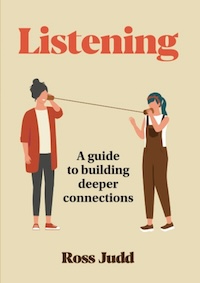Why real listening could be the parenting shift you need

Real listening goes beyond hearing words—it builds connection, trust and emotional safety. Here’s why it matters more than you think.
I was working in my home office and noticed my daughter, Emily, hanging in the doorway. It was unusual and I could tell something was wrong. I pushed my chair back and sat on the floor. She came in, sat opposite me and slowly started telling me about a problem at school.
In her words, some friends were “being mean” to her. I had to curb my reactions. I wanted to sort this out, but I knew that’s not what Emily needed. She didn’t need “problem solving” or “action planning”. She needed a connection.
Digging deeper
Over the years, I’ve learned that when someone is worried, upset or just concerned, they never tell you the real issue. They always start with something else. The first topic is just an audition to see if you will connect and understand.
I had a suspicion that the issue at school was my audition and that was confirmed when Emily asked me for suggestions on how to resolve it. I discovered she had already either dismissed or actioned my ideas. She had decided not to talk to her teachers about it, had confronted the friends about their behaviour and had already started making new friends. It was an impressive response for a 10-year-old.
My mind was racing to think of another solution while also wondering what was really worrying her. I was out of ideas, so I suggested we ask her mother.
“NO, NO, NO. Please don’t tell Mum. Please, please, please, don’t tell Mum.”
I was surprised by this reaction and went silent. It confirmed that the issue at school was not the real issue.
As Emily slowly opened up, it became clear that her mother’s playful teasing was having an adverse effect. Emily wasn’t taking it the way it was intended. In the normal course of their relationship, it didn’t matter—but now, when she wanted to talk about something she felt like her mother would tease her instead of listening and understanding.
This realisation created an important breakthrough moment for our family. I witnessed an embrace between mother and daughter that was full of love, hugs and tears. It was an opportunity that still brings tears to my eyes over a decade later. A powerful and important connection was (re)born that has been wonderful for them both and lasts to this day.
What if?
It’s well over a decade since that happened, and it’s worth asking what Emily would have grown up believing if she had got a different reaction that day. What if I had asked questions, or sorted out the problem at school, or shared a similar experience from when I was at school? Would I have uncovered the deeper concern? Would she have come to me or her mother, with bigger issues later in life? What beliefs, ideas and feelings would have set in if no-one had understood her deeper concern in that moment and she had subsequently grown-up thinking no-one would understand?
“The deepest hunger of the human heart is to be understood,” American businessman and author Stephen Covey once said.
We all crave understanding, especially children, and the only way to demonstrate understanding is by listening and summarising what they are saying. Nothing else demonstrates understanding.
Listening with the intention of demonstrating understanding is one of the most affirming and loving things you can do for another human being. It’s a gift that you can give your children that will cost you nothing but will mean everything to them. It will help you build the connections you both crave.
In the video below, psychologist Collett Smart discusses what active listening is.
How to really listen in three simple steps
If you would like to connect with your children and uncover the deeper issue, then try these three simple steps.
1. Recognise the opportunity
It’s important to note that this level of listening is not something you do as part of your day-to-day routine. You can’t listen this intently all the time. It’s too much! You need to reserve this type of listening for those moments when they really need your help.
This means the first step is to recognise the opportunity when it appears. There are hints and clues that indicate the situation is more serious than normal. Are they behaving differently or hesitating? Do they look worried or upset? Are they emotional? Have they asked for your help?
You are not doing this with strangers, you are doing this with people you know and love so pay attention. If you get any kind of clue that the situation seems more “serious” than normal then it’s time to really pay attention, listen and demonstrate understanding.
2. Open up the conversation
How would you react if your child started talking about problems at school? Would you tell them what to do, ask questions, tell stories, solve the problem, share your opinion, correct them or even take control of the situation?
Our listening habits are OK in normal situations but ineffective when they need help to uncover the deeper issue. Any of those responses listed above will stop you getting to the deeper issue.
From the other persons perspective those responses will take the conversation off track or shut it down completely, and stop them opening up about the deeper concern. Instead of getting the help and connection they need they will give up and look for a connection somewhere else.
The best way to open up the conversation is by either staying silent and letting them talk or using neutral questions and statements like “go on” or “tell me more”. These simple prompts will encourage more information without influencing where they want to take the conversation. They will let them talk about the topic they really want to talk about.
3. Summarise
You may know this skill as paraphrasing or reflective listening. Whatever you prefer to call it, summarising is the only way to demonstrate understanding. When you summarise, you are repeating back what you heard in your words. It’s a wonderful way to acknowledge what they’ve said and demonstrate you understand.
And here’s a life hack that’s worth remembering. It doesn’t even have to be a good summary. Most people are so desperate to be understood they will appreciate any effort to summarise what they are saying. Even a bad one! You will be surprised by how quickly they jump in to correct your summary and help you understand. Remember, it’s the deepest hunger of their heart.
The foundation of a lasting parent-child bond
When you make the effort to listen to your children in this way you will be surprised what you learn and the connection and bond that you will create. In my experience there’s no better way to build the type of lasting relationship that you both crave.
Read next: How long kids want to spend with their parents—and it’s longer than you think

Ross’s new book Listening: a guide to building deeper connections is out now, and he believes that these skills are essential to practice with our children.




